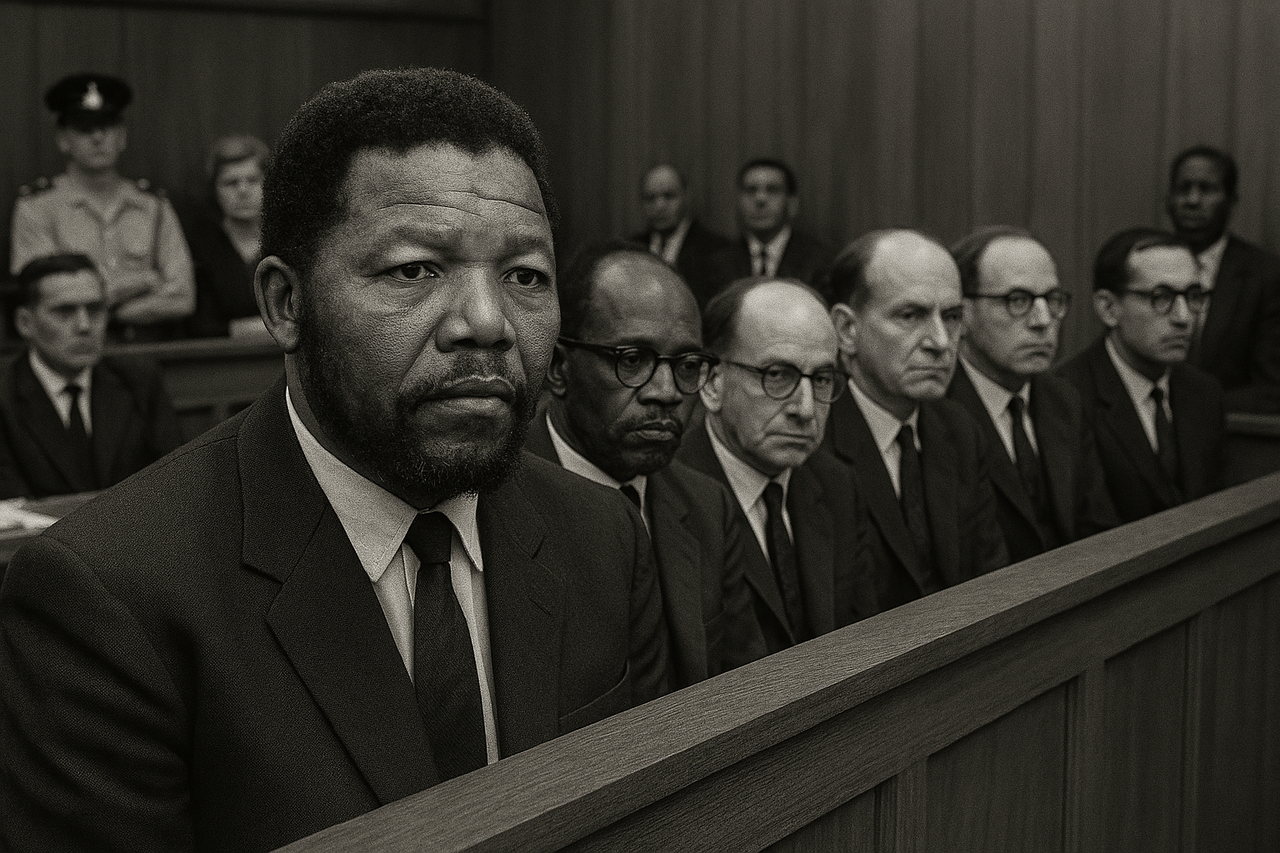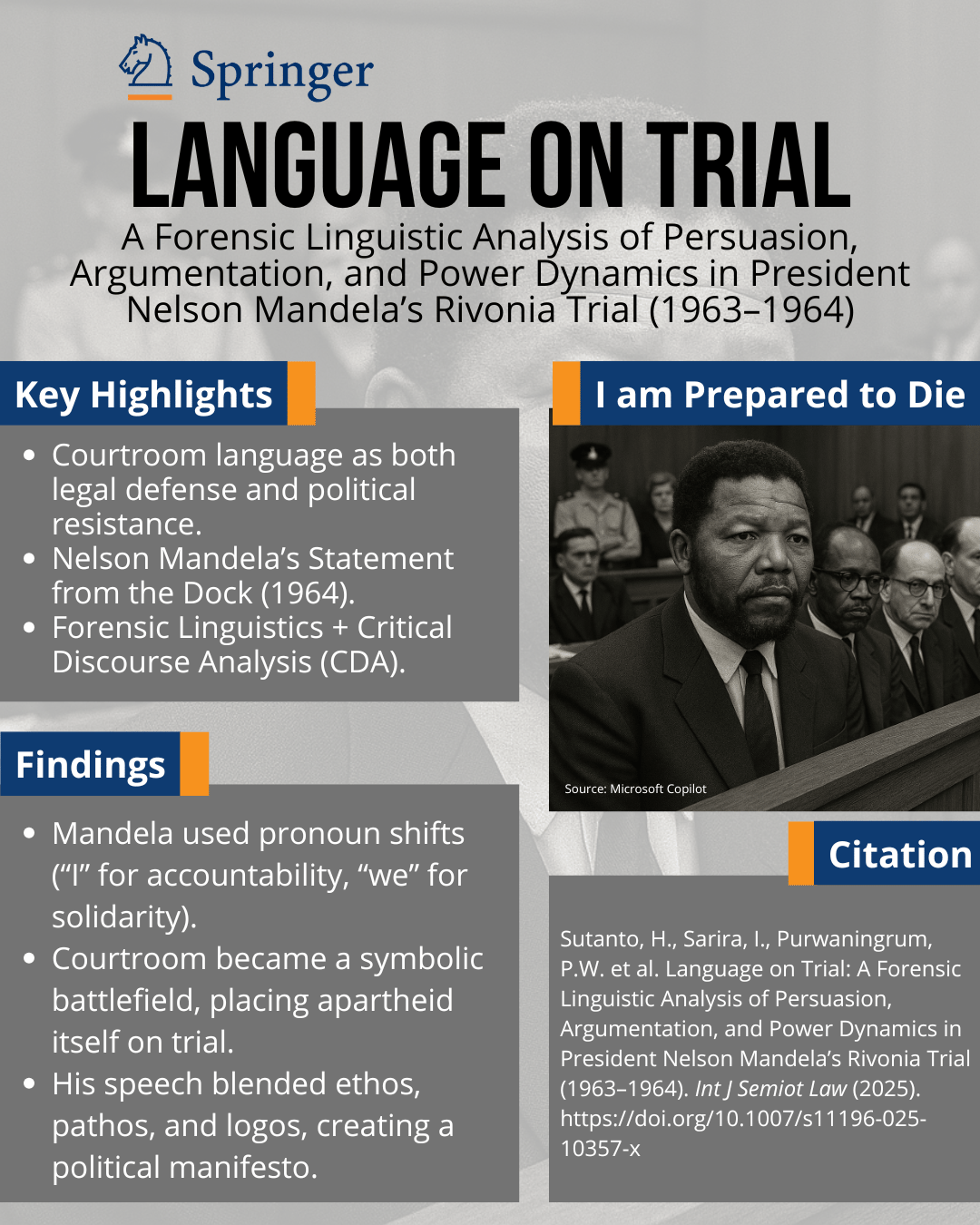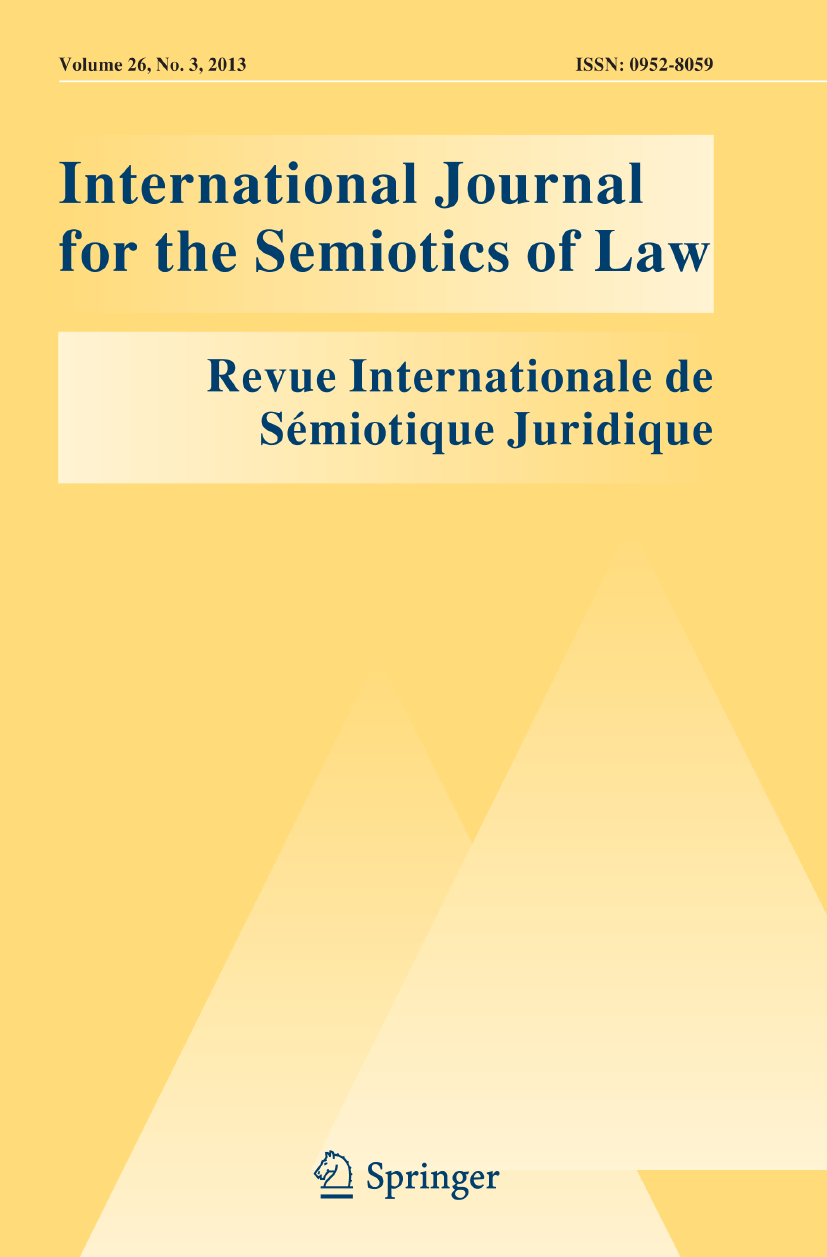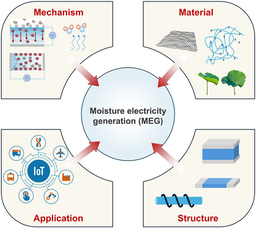Language on Trial: Mandela’s Rivonia Trial and the Power of Words
Published in Sustainability, Arts & Humanities, and Law, Politics & International Studies


as Forensic Linguistic Evidence of Power, Persuasion, and Resistance
Source: Author
Read full article here

Sutanto, H., Sarira, I., Purwaningrum, P.W. et al. Language on Trial: A Forensic Linguistic Analysis of Persuasion, Argumentation, and Power Dynamics in President Nelson Mandela’s Rivonia Trial (1963–1964). Int J Semiot Law (2025). https://doi.org/10.1007/s11196-025-10357-x
Introduction
In April 1964, standing in the dock of the Pretoria Supreme Court, Nelson Mandela faced charges that could end his life. Alongside other leaders of the African National Congress (ANC), he was accused of sabotage and conspiracy against the apartheid regime. Yet what the world remembers most about the Rivonia Trial is not the charges, nor even the sentence of life imprisonment, but Mandela’s words. His closing statement, which ended with “I am prepared to die,” transformed the trial into one of the most powerful demonstrations of how language can resist oppression, claim dignity, and reframe injustice as a moral struggle.
This blog post explores how the Rivonia Trial illustrates the enduring power of words in law and politics. It considers the historical and legal context of the trial, analyzes Mandela’s rhetorical strategy, reflects on the role of courtroom language in shaping justice, and asks what lessons remain for us today.
Historical and Legal Background
The Rivonia Trial (1963–1964) was a turning point in South African history. Named after Liliesleaf Farm in Rivonia—where police discovered documents linking the accused to the ANC’s armed wing, Umkhonto we Sizwe—the trial sought to crush the anti-apartheid movement. Mandela and his co-defendants were charged with acts of sabotage designed to overthrow white minority rule. The death penalty loomed as a real possibility.
Apartheid courts were far from neutral. Legal proceedings often served to legitimize state violence, framing resistance as criminality. Yet trials also became spaces where the accused could seize language back from the state. Just as colonial courts across Africa and Asia once sought to silence nationalist leaders, the Rivonia Trial became a platform for Mandela to put apartheid itself on trial.
By the end of the hearings, Mandela’s words had reached far beyond the courtroom. International newspapers quoted his statement, solidarity movements echoed his voice, and even within South Africa his words inspired hope in communities long silenced by repression. The trial, meant to end a movement, instead immortalized its leader.
The Power of Words: Mandela’s Rhetoric
Mandela’s statement from the dock remains one of the most studied speeches of the 20th century. His rhetorical choices reveal how language can transform a legal defense into a moral declaration.
Reframing Criminality
The prosecution portrayed the accused as saboteurs and terrorists. Mandela reframed the charges by situating them in the context of systemic injustice: apartheid denied basic rights, excluded the majority from political life, and criminalized peaceful protest. By appealing to universal principles of justice, he turned the trial from a criminal proceeding into a referendum on human rights.
The Power of Identification
Mandela’s language was inclusive. He spoke not only for himself but for millions: “I have cherished the ideal of a democratic and free society in which all persons live together in harmony and with equal opportunities.” This shift from the personal to the collective created identification between speaker and audience, echoing traditions of African oratory where the leader embodies the people.
The Defiant Closing
His final words—“It is an ideal for which I am prepared to die”—were both defiance and sacrifice. He placed himself in a lineage of freedom fighters who understood that martyrdom could be as powerful as victory. In rhetorical terms, this was not a plea for mercy but a moral challenge to the court: if the judges chose to condemn him, they would condemn not just a man, but an idea.
These rhetorical strategies highlight how language in the courtroom is never neutral. Legal discourse seeks precision and authority, but resistance language reintroduces morality, history, and humanity into the sterile language of law. Mandela’s statement exemplifies this clash.
Behind the Scenes: Research and Reflection
My own interest in the Rivonia Trial emerges from a broader fascination with the intersection of law and language. As a language editor and academic working across fields of linguistics, communication, and law, I often ask: how do words shape justice? Courtrooms are spaces where every word matters—where definitions, testimonies, and rhetorical framing can decide freedom or imprisonment.
In researching this post, I turned to trial transcripts, historical analyses, and rhetorical studies. Mandela’s speech has been preserved in archives and taught in classrooms worldwide, yet reading it in full reveals details often lost in soundbites. The careful structure, the balance between legal defense and moral claim, the tone of calm conviction—all these reflect deliberate rhetorical craft.
Writing about this trial is also a personal reflection. As someone from Indonesia, I am aware of how language has shaped our own struggles for independence, democracy, and human rights. Mandela’s example resonates beyond South Africa because it shows that words, when spoken at moments of crisis, can carry the weight of history.
Relevance for Today
Mandela’s Rivonia statement is not only a historical artifact; it remains strikingly relevant in today’s world. Around the globe, political leaders, activists, and even ordinary citizens continue to rely on words to challenge injustice. Courtrooms remain battlegrounds where language frames guilt, innocence, legitimacy, or illegitimacy.
Contemporary examples abound. Trials of whistleblowers, journalists, and activists often hinge as much on the narratives they construct as on the legal codes applied. In the digital age, courtroom speeches circulate instantly through social media, amplifying their reach but also competing with misinformation and fragmentation. Mandela’s speech reminds us that clarity, moral grounding, and inclusive vision can cut through noise and endure across generations.
Moreover, the Rivonia Trial prompts reflection on the ethics of legal discourse. Who gets to define “terrorism”? How does the law distinguish between crime and resistance? And how can those silenced by legal institutions reclaim their voices? These questions remain urgent in an era of global protest, contested democracies, and struggles for equality.
For members of the Springer Nature Communities—whether in law, politics, or the humanities—the Rivonia Trial illustrates the enduring importance of studying rhetoric as both a cultural and political force. It bridges disciplines, reminding us that history, communication, and law cannot be separated when justice is at stake.
Conclusion
Nelson Mandela once said that words are powerful weapons. At the Rivonia Trial, he proved it. His statement from the dock did not save him from imprisonment, but it transformed his image from defendant to moral leader. It reframed a political trial into a universal struggle for justice, and it ensured that the language of equality would echo long after the gavel fell.
For scholars and citizens alike, the lesson is clear: language in law is never merely technical. It can be an instrument of oppression, or it can be wielded as a tool of liberation. Mandela’s words remind us that even in the most constrained settings—even when the outcome seems predetermined—speech can alter the course of history.
As we reflect on our own roles as writers, researchers, and thinkers, the Rivonia Trial challenges us to ask: what ideals are we prepared to speak for, and how will our words shape the future?
Follow the Topic
-
International Journal for the Semiotics of Law - Revue internationale de Sémiotique juridique

This is a global journal dedicated to legal semiotics, bridging law and language through jurilinguistics, legal philosophy, and the philosophy of language, with submissions welcomed in English and French.
Related Collections
With Collections, you can get published faster and increase your visibility.
Human Rights, Recognition and Decoloniality
The special issue aims to intertwine the decolonial perspective with the struggle for recognition and against discrimination, to listen to the voices of historically marginalized groups in order to define the crucial experiences for a discussion on human rights and facilitate a deeper understanding of the complexities that different identities face in current historical-social conditions.
Publishing Model: Hybrid
Deadline: Mar 31, 2026




Please sign in or register for FREE
If you are a registered user on Research Communities by Springer Nature, please sign in